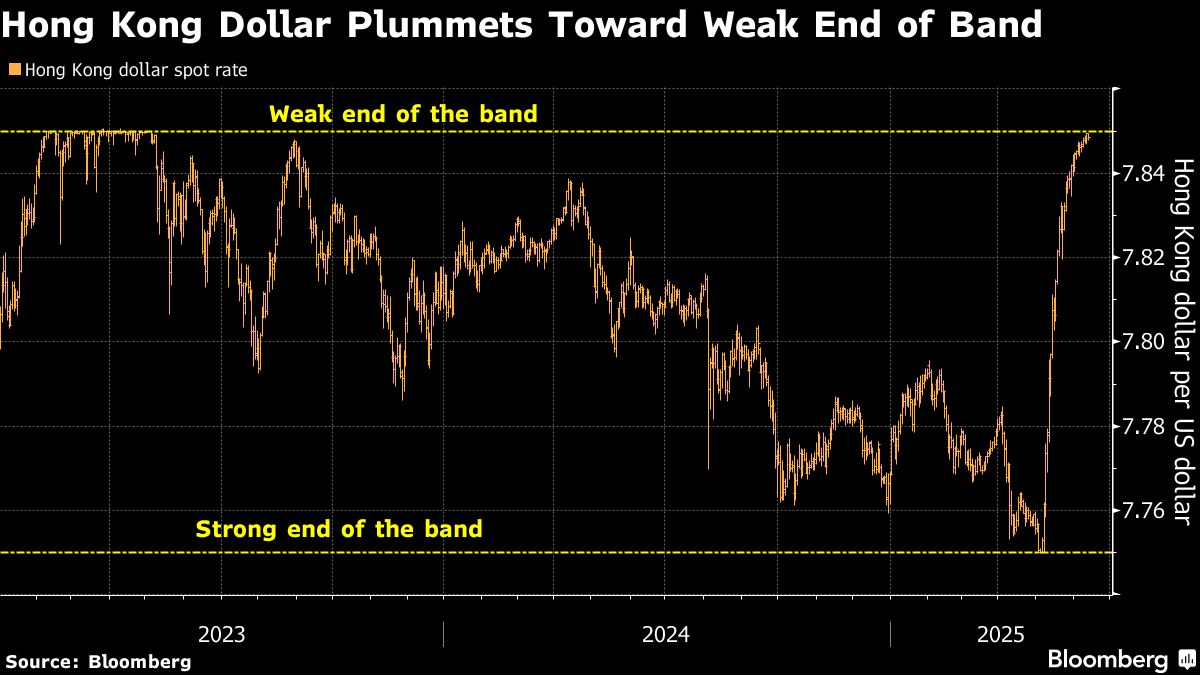Tian Chen and Iris Ouyang
5 min read
In This Article:
(Bloomberg) -- An unprecedented disconnect between Hong Kong and US interest rates is fueling the world’s top-performing carry trade — and stoking a fresh debate about the long-term appeal of the city’s pegged exchange rate.
Most Read from Bloomberg
-
Trump’s Military Parade Has Washington Bracing for Tanks and Weaponry
-
NY Long Island Rail Service Resumes After Grand Central Fire
Hong Kong’s currency has slumped in recent weeks toward the weak end of its official trading band against the greenback, after local interest rates fell to a three-year low and widened the discount to their US peers to rarely seen levels. This has fueled demand to use the Hong Kong dollar to invest in the higher-yielding US currency, turning the bet into the world’s most rewarding carry trade over the past month by one measure.
While there are few signs of an imminent threat to the 42-year-old currency peg, its relevance is coming under fresh scrutiny at a time when Hong Kong’s economy is increasingly integrated into China’s and global trade is under siege. While a relatively steady exchange rate is considered key to the Asian financial hub’s open economy, it brings along the often undesirable side effects of local interest rates being dictated by the Federal Reserve’s policy.
The one-month Hong Kong Interbank Offered Rate, a gauge of funding costs also known as Hibor, dropped to the lowest level since 2022 this week. Within two months, the benchmark has slumped at the fastest pace since the global financial crisis.
Ironically, a key driver of the rate plunge was HKMA’s record liquidity injection early last month, when a selloff in the US dollar drove Hong Kong’s currency to hit the strong end of its HK$7.75 to HK$7.85 band. The intervention has led to a fourfold increase in the city’s interbank liquidity pool.
Meantime, the low rates are also a reflection of anemic corporate demand for loans, as the city continues to battle its way out of a post-pandemic slump. Hong Kong lenders’ loan-to-deposit ratio fell to a 16-year low in March.
As the Hong Kong dollar inches closer to the low end of its trading band, concerns are growing that any aggressive intervention by the HKMA may undermine the city’s nascent property market recovery and a world-leading rebound in stock listings. The prospect of such economic distortions has revived discussions about the benefits of the rigid currency peg.
“One of the arguments for de-peg is that Hong Kong’s rates won’t be passively affected by US policy especially when the economic situation is diverging,” said Carie Li, global market strategist at DBS Bank. “However, there are more drawbacks than benefits for an imminent adjustment, as that could erode confidence in the peg system and hence local assets, as well as spark speculation on more changes to the currency regime.”













